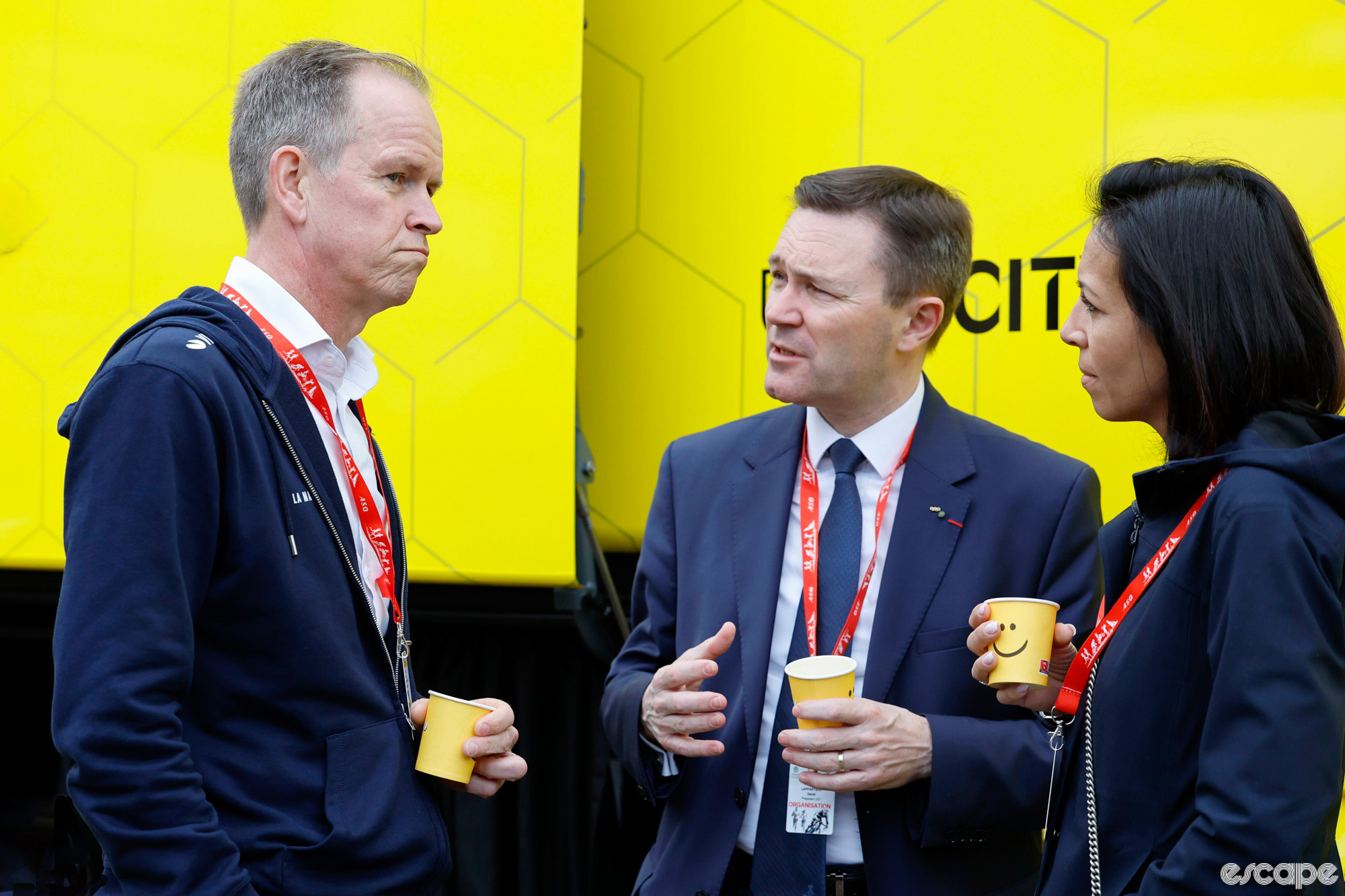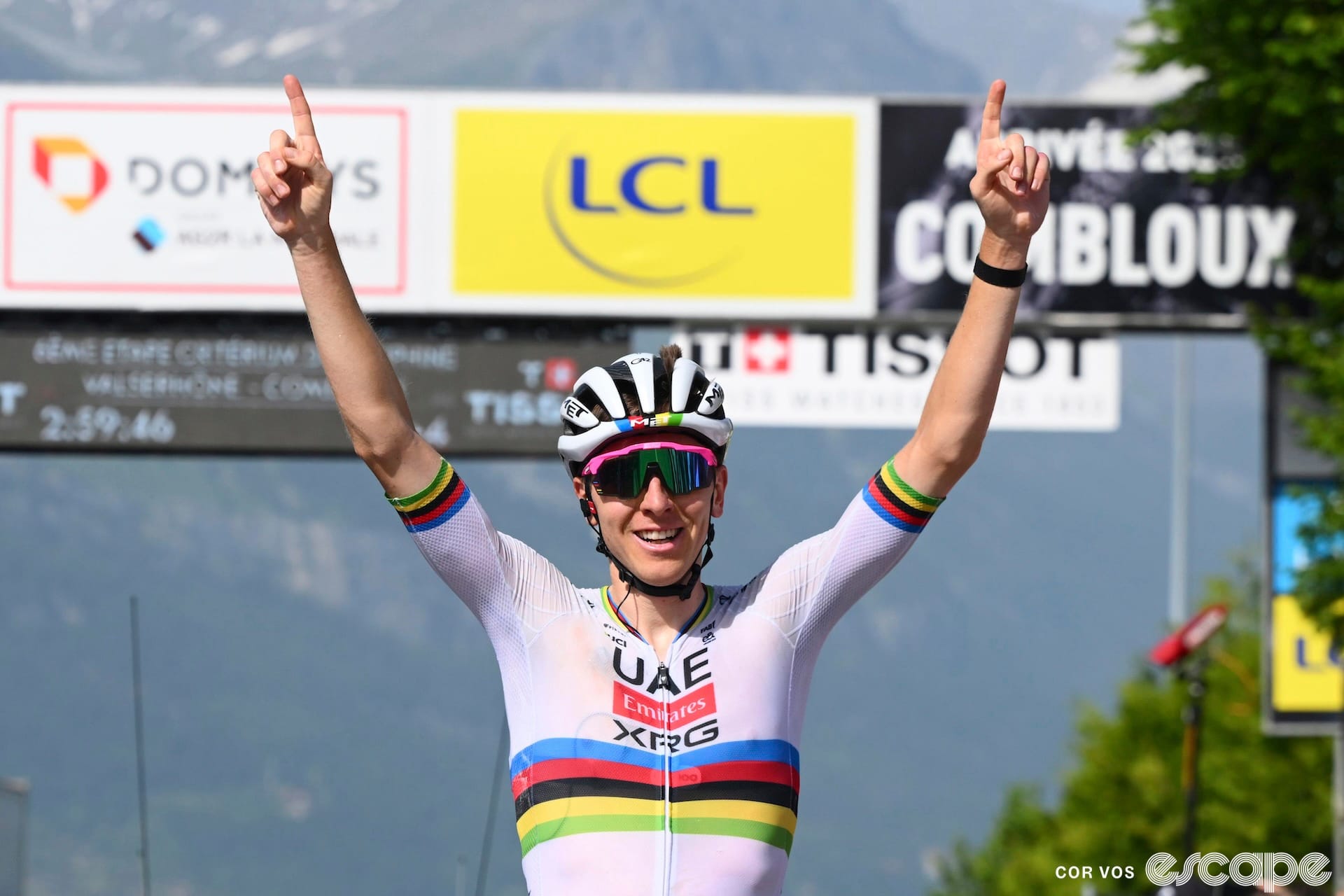Visma-Lease a Bike general manager Richard Plugge has addressed the main concerns fans have about the proposed One Cycling project and made a case for its implementation, saying that without change, the sport could face an existential threat within the next decade.
Escape Collective revealed last week that there is a high level of optimism among the sport’s stakeholders that One Cycling – a project designed to pit the best riders against each other more regularly, as well as overhaul the sport’s economic model – could be launched within a matter of weeks.
Part of the proposal, which would take effect from the 2026 season, involves a more streamlined calendar without overlapping races and more circuit finishes to enable ticketed entry, similar to the Tour of Flanders, which changed its route in 2017 to accommodate VIP areas. The project would also be funded by Saudi Arabia, to the tune of up to €300 million. Public reaction to the idea, however, has been overwhelmingly negative.
Speaking at his Visma team’s media day in La Nucia, Spain, Plugge, who has been leading One Cycling negotiations for more than two years, told Escape and other media, “I cannot say anything about what you’re talking about,” referencing the non-disclosure agreements that have been signed. He then proceeded to say quite a few things about the topic before offering a stark warning about cycling's future.
“What I would be afraid of as a fan is that in 10 years’ time, a lot of races will not exist anymore,” he said, pointing out the increasing amount of road furniture, stricter traffic regulations, and the rising costs of closing down city centers. “If I was a fan of cycling, which I am, I would be worried because it will stop at a certain point in time … and I would be happy if there are people changing that for the better.
“Ten years ago, the Tour of Flanders decided to reshape the parcours, and everybody was against it. It was the second revolution of Belgium at the time, and nowadays it would be the third revolution if you changed it back to the old route because everybody sees that it’s better. I think if you look at these kinds of formats, first you have a more sustainable future for these races because of the traffic density in that area. The parcours would be safer, but it would also be better for the fans because it’s nicer to watch. I think you should stay true to the nature of cycling, as close to what it is today as possible, because you don’t want to alienate the current fans. But on the other hand, you can tweak it a little bit.”
When asked if spectators would accept buying a ticket to watch a race in a more desirable spot, Plugge said: “I don’t know if you have to pay for it, but at least it is more fun to see them passing by three times rather than seeing them once. And for the organizer, it’s easier to organize.”
There has also been criticism from many quarters about the projected investment from Saudi Arabia, a country that continues to face serious questions over human rights. There is already a small amount of Saudi money involved in various cycling teams, and the country also hosts the AlUla Tour in early February.
“There is a lot of money coming into all sports. I don’t know if there will be money from Saudi Arabia, but we are in business, and we go forward,” Plugge said. (On the subject of Saudi investment in sports, as Plugge spoke, the New York Times reported that Surj Sports Investment, the Saudi sovereign wealth-funded vehicle that is reportedly the main investor in One Cycling, has reached a deal to buy sports streaming service DAZN for US$1 billion.)
“I also sometimes hear criticism of other sponsors of big teams. OK, but what do you want? This country criticizes that country; that country criticizes this country or people from that country. For me, I am always happy with every bit of support we can get for the sport because ultimately, it puts people on the bike and shows that we can get from A to B with human power. Ultimately, if we can have more people moving and using their muscles instead of sitting in their cars, that’s what I’d like to see.”
The UCI told Escape that it is “expecting further information on the developments of the One Cycling project,” and the sport’s president, David Lappartient – who has links with Saudi Arabia – has been kept abreast of the negotiations. Plugge suggested that Lappartient is keen on ensuring a prosperous legacy, hinting that the Frenchman might want to rush One Cycling through in the coming months before the March elections for the presidency of the International Olympic Committee, for which Lappartient is one of the favorites.
“I think many people have the same idea, and I think David Lappartient wants to leave the sport in a better place, especially from a business perspective. He is a business guy originally,” Plugge said. “He sees that we can have a better sport if we improve the business model, and there are many families [stakeholders – Ed.] who are happy to join that idea. He doesn’t want all his families, as he calls them, to be mad at him. He wants them to be happy with him in the coming two months. That’s very important to him. So, in that sense, if and when he leaves, he would leave a happy family behind, and that’s one of his main goals over the coming weeks. That’s good for us.
“I think everybody sees the same problem in cycling: Where will we be in 10 years? We are now the chicken with the golden eggs. But how long can we sustain that? We should not slaughter that. Lappartient is really aware of this, and he sees that we need to move the needle quickly.”
Did we do a good job with this story?




